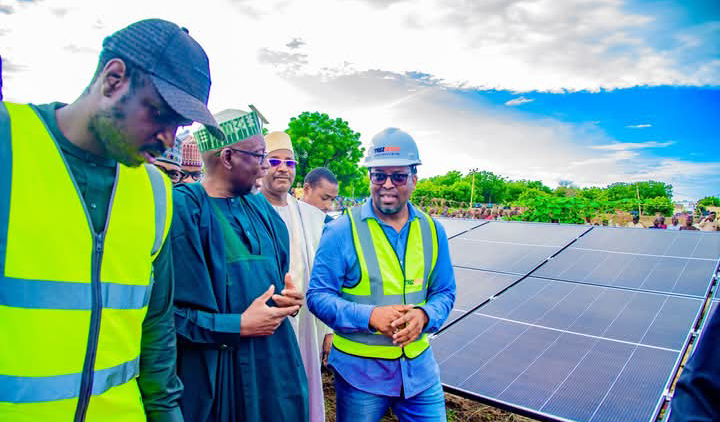
JUST IN: Governor Umar Namadi Unveils N1.2bn Solar-Hybrid Power Project in Jigawa as State Pushes for Energy Revolution

In what has been described as a groundbreaking step toward sustainable energy development and economic transformation in Jigawa State, Governor Umar Namadi has officially inaugurated a 500KWp solar-hybrid mini-grid in Kafin Hausa Local Government Area, a project valued at N1.2 billion. The commissioning of this state-of-the-art facility signals a new era for power supply in the region, where electricity scarcity has long hindered growth and stifled local businesses. The governor, while addressing a gathering of government officials, community leaders, business owners, and jubilant residents at the inauguration ceremony, emphasized that the project is not merely an investment in power but an investment in the future of the state. He noted that the solar-hybrid grid stands as a testament to his administration’s commitment to driving development through innovation, renewable energy, and infrastructural advancement.
The 500KWp solar-hybrid project is designed to provide steady and reliable electricity to households, schools, small-scale industries, and business centers in Kafin Hausa and surrounding communities. This initiative is expected to stimulate economic activities, reduce rural-urban migration, and create an enabling environment for entrepreneurship to thrive. Governor Namadi highlighted that the energy project is strategically aligned with the broader objectives of his administration’s 12-point agenda, particularly in the areas of infrastructure, human development, and economic empowerment. According to him, the mini-grid is not only about lighting homes but about lighting up opportunities that will shape the destiny of Jigawa’s youth and future generations.
The commissioning of the solar-hybrid grid comes at a time when Nigeria continues to grapple with an energy deficit that has crippled industries, left communities in perpetual darkness, and placed additional burdens on families and businesses who resort to expensive alternatives like diesel and petrol generators. With the introduction of this project, residents of Kafin Hausa will now enjoy a more reliable and affordable energy source, thus reducing their dependence on costly fossil fuels and mitigating environmental degradation caused by carbon emissions. The move has already been lauded by energy experts and development partners as a model that could be replicated across other parts of the country to address Nigeria’s persistent power challenges.
Speaking at the event, Governor Namadi expressed his appreciation to all stakeholders, including private partners, engineers, and local contractors who played key roles in the execution of the project. He reassured residents that the project is part of a broader energy strategy his administration is pursuing, with plans already underway to replicate similar renewable energy solutions in other local government areas of the state. He stressed that energy is the backbone of development and his government is determined to use every available resource to expand access to affordable electricity in both rural and urban areas. The governor added that the project also demonstrates Jigawa State’s alignment with the federal government’s commitment to renewable energy, climate action, and the Sustainable Development Goals (SDGs), particularly Goal 7 which seeks to ensure access to affordable, reliable, sustainable, and modern energy for all.
The mood in Kafin Hausa was electric as community members welcomed the project with excitement and gratitude. Many residents, particularly business owners, expressed optimism that the solar-hybrid grid would revolutionize their livelihoods. A local welder, who spoke to reporters during the event, said that before now, he could only work for a limited number of hours due to unreliable power supply and the high cost of fueling his generator. With the mini-grid now in place, he expects to expand his business and employ more apprentices. Similarly, women entrepreneurs in the area, especially those involved in food processing and tailoring, expressed hope that the new power source will enable them to scale their operations, reduce costs, and boost their incomes. Parents and teachers in the community were also elated, noting that the availability of electricity will improve education as students will be able to study under better conditions, while schools will have access to digital learning tools and modern teaching aids.
The inauguration ceremony was attended by senior government officials, members of the state executive council, traditional rulers, representatives of donor agencies, and energy experts who all commended the initiative. In their remarks, they described the project as timely and visionary, given the growing global consensus on the need for countries to embrace clean and renewable energy sources. They further noted that the solar-hybrid grid would not only address the immediate electricity needs of the community but also serve as a catalyst for broader social and economic transformation.
The governor’s move has also drawn national attention as many observers argue that state governments must take more proactive roles in bridging Nigeria’s power deficit. While the federal government continues to implement reforms in the power sector, projects like the one in Kafin Hausa demonstrate how state-led initiatives can deliver tangible results that directly impact the lives of ordinary citizens. Analysts believe that such initiatives, if sustained and replicated, could significantly reduce Nigeria’s reliance on the struggling national grid and move the country closer to energy independence.
Beyond the immediate benefits, the solar-hybrid mini-grid is also expected to have long-term implications for environmental sustainability in Jigawa State. By reducing reliance on petrol and diesel generators, the project will help cut down greenhouse gas emissions and contribute to Nigeria’s climate action commitments under international agreements. Experts point out that renewable energy solutions like this are critical in the fight against climate change, particularly in regions like northern Nigeria that are already facing the adverse effects of desertification and environmental degradation.
As the sun set over Kafin Hausa after the colorful commissioning ceremony, the new solar-hybrid grid stood as a beacon of hope, promising not just light but opportunity, growth, and sustainability. The symbolic act of Governor Namadi switching on the project was greeted with loud cheers, as residents saw their community ushered into a new chapter. For Jigawa State, this is more than just an energy project; it is a bold statement that the state is ready to embrace modern solutions to age-old challenges. It is also a strong signal that Governor Umar Namadi’s administration is keen on delivering tangible dividends of democracy through people-centered projects that directly improve the quality of life.
In the coming months and years, all eyes will be on how the Kafin Hausa solar-hybrid grid performs and the extent to which it transforms the socio-economic landscape of the community. For now, however, there is no doubt that history has been made in Jigawa State. A N1.2 billion investment has been turned into a lifeline for thousands of residents, and the ripple effects are expected to be felt across businesses, households, and future generations. Governor Namadi has not just inaugurated a solar project; he has planted the seeds of an energy revolution in Jigawa State.


